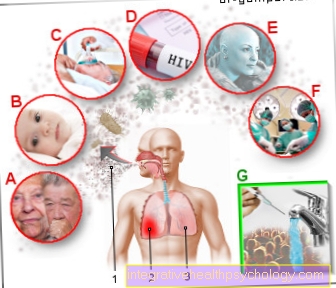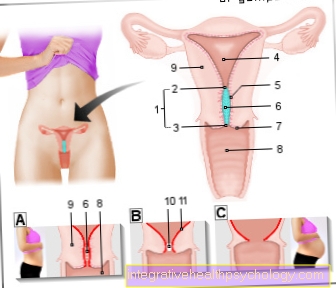Changes in the mucous membrane of the mouth
What is an oral mucosal change?
The change in the oral mucous membrane is a pathological change in the mucous membrane in the area of the tongue, cheek, palate or alveolar ridge. This can be roughness, elevation, hardening or thickening. Changes in color towards red or white are also possible. The changed areas can blister, become sore, or form nodules. Many clinical pictures are possible depending on the disease. Oral mucosal disease should be clarified immediately and, if necessary, treated before it can lead to worse consequences (e.g. cancer).

What changes in the oral mucosa are there?
-
Leukoplakia as a precursor of oral cavity carcinoma (cancer) on the cheek and tongue
-
Squamous cell carcinoma
-
Lichen planus
-
thrush
-
Herpes infection
Leukoplakia
Leukoplakia is a whitish, non-wipeable, non-itchy, painless and sharply delimited change in the oral mucous membrane, which usually does not regress completely. It mainly develops in the area of the lip and the inner lining of the cheek. The risk of developing leukoplakia is increased when chronic stimuli act on the oral mucosa. These include chemical stimuli such as cigar or cigarette smoke, mechanical stimuli such as poorly fitting dentures and biological stimuli such as viral infections. These noxae lead to a thickening of the uppermost skin layer, the so-called horny layer, which means that the vessels below are no longer recognizable and the area appears whitish.
The leukoplakia should be examined regularly by the dentist, as there is a risk of malignant degeneration depending on the degree of development. If the findings change or increase, the treating doctor can take a sample and send it to a microbiological laboratory. A detailed examination can take place there and a malignant disease can be quickly identified and treated. In this case, the treatment of choice is the complete surgical removal of the findings.
Read more on the subject at: Leukoplakie What are the dangers?
Squamous cell carcinoma
Squamous cell carcinoma describes malignant tumors of the skin and mucous membranes and is the second most common type of skin cell tumor. In the oral cavity, it mainly affects the cheek mucosa, tongue or throat. The disease develops on severely damaged skin areas or chronic wounds. Causes can be increased mechanical irritation of certain areas of the cheek mucous membrane due to poorly fitting dentures, but also chemical irritation due to constant inhalation of cigarette smoke.
After a confirmed diagnosis, therapy consists in the complete removal of the findings. Since there is an increased risk of this type of cancer spreading, the adjacent lymph nodes are very often also removed so that disease in the rest of the body can be prevented. Usually, the operation is followed by chemotherapy and / or radiation therapy, depending on the degree of the disease.
The earlier the disease is recognized and treated, the higher the chance of recovery. If the result is less than 2 cm, the chances of a cure are very good. However, if the tumor has already spread, the prognosis is much less favorable. As with all types of cancer, squamous cell carcinoma can take a long time to heal, as well as regular follow-up examinations.
For more information, see: Squamous cell carcinoma
Canker sores
Aphthae are small, yellow, fluid-filled blisters that have a red border and are usually filled with fluid. The vesicles often heal spontaneously within 10-14 days. The canker sores are divided into minor and major canker sores. The minor canker sores are only a few millimeters in diameter, while the large ones can be up to 3 cm in diameter. The smaller ones stay superficial and heal spontaneously, the larger ones penetrate deep into the mucous membrane. There they can develop a deep-seated inflammation and take several weeks to heal. It is a reversible disease that heals on its own and leaves little or no traces (small scars).
Also read the article on the topic: Aphthae- what causes small blisters in the mouth?
Home remedies or mouthwash solutions from the pharmacy can influence the healing process and reduce the duration of the illness. Rinsing with chamomile tea or drizzling the canker sores with tea tree oil are ideal. The Pyralvex mouthwash from the pharmacy is particularly helpful. With the right oral hygiene, canker sores heal quickly and easily.
You might also be interested in this topic: Aphthae- Which home remedies help against the pain?
Oral thrush
Oral thrush is a fungal disease caused by the pathogen Candida Albicans, which mainly spreads in the mouth and throat. The characteristic symptom is a whitish, wipeable coating on a reddened oral mucosa. Sometimes only reddened tongue areas appear. Further symptoms are a feeling of dry mouth and an associated feeling of thirst, as well as taste disturbances and bad breath. Most of the time, the infection occurs when the immune system is weakened, when another disease is prevalent or medication is being taken to suppress the immune system.
Read more on the topic: Oral thrush
The treatment is carried out with special antimycotics, so-called antifungal agents, such as nystatin. These are administered in the form of lozenges, solutions or gels; administration in tablet form is rarely necessary. It is important that the duration of treatment is adhered to precisely so that the disease can not flare up again. The prognosis is good, as soon as the treatment is complete, the fungus has been fought and no further restrictions must be expected.
Find out more about the topic: Nystatin
Thyroid disease
In the case of thyroid diseases, the underactive thyroid is primarily responsible for symptoms on the oral mucosa. Affected people report a generally dry mucous membrane, especially in the mouth area, because the mucous membranes can no longer produce enough fluid due to the lack of hormones. With the right medication, however, these feelings disappear again.
On the other hand, changes in the oral mucous membrane also occur in the treatment of an overactive thyroid, especially Graves' disease. The excessively produced hormones lead to nervousness, palpitations, sweating and increased reflexes. To reduce the symptoms, the doctor prescribes thyroid hormone blockers, so-called anti-thyroid drugs. If this drug is not tolerated, allergic reactions occur, which can also affect the oral mucosa.
Also read the article on the topic: Graves disease
Scarlet fever
Scarlet fever is an infectious bacterial disease that mainly occurs in childhood. In addition to headaches and sore throats, the infection causes the palate and throat to redden, and the tonsils are often white.
The typical sign in the mouth, however, is the so-called raspberry tongue: after the whitish coating is gone, the tongue turns raspberry-colored, which is also called glossitis, i.e. the inflammation of the tongue. Treatment with antibiotics can prevent long-term damage and bring about rapid healing.
Further information on the subject can be found at: Scarlet fever rash
Herpes infection
Herpes infection is a widespread viral infection that persists for a lifetime and always spreads when the immune system is weakened. The disease is highly infectious and spreads through direct contact with other people, for example when kissing or playing together in kindergarten.
The known symptoms include itching and tingling of the affected skin areas, mostly the lip, and the subsequent formation of fluid-filled blisters. These burst open in the course of healing and heal crusty but not pitted within 6-10 days.
Read more on the topic: Herpes in the mouth
Sjogren's Syndrome
Sjogren's syndrome is a chronic autoimmune disease that leads to inflammation of the salivary glands. In addition to dry mouth, the eyes also begin to get very dry. The tongue sticks to the cheek due to the lack of moisture and there is a constant feeling of thirst.
The exact cause has not yet been researched, but there is a certain hereditary component.Treatment is based on the symptoms and involves moistening the eyes and relieving pain with ibuprofen. In the case of severe symptoms, medication can be administered that suppress the immune system and so make the symptoms subside.
Read more on the topic: Sjörgren's Syndrome
Recommendations from the editorial team
- How contagious are canker sores?
- Mouth rot
- Pain in the tongue
- Squamous cell carcinoma of the tongue
- Palate cancer










.jpg)


















